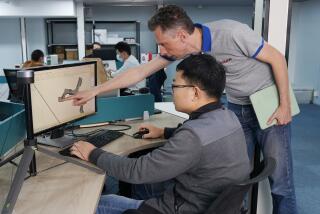In Southern Island Province, China’s Economic Reforms Are Still Alive : Investment: Hainan continues to attract foreign money despite the mainland’s tight credit and reimposed central controls.
HAIKOU, China — Hong Kong entrepreneur L. K. Sun, showing expensive, computer-controlled printing equipment to a visitor, waxed enthusiastic about his business prospects here.
“The population of China is very large,” Sun said. “If everyone buys one post card, it’s incredible!”
Sun’s vision is centuries old, dating back to British traders who dreamed in vain of selling textiles to a limitless Chinese market. These days, among those familiar with the myriad difficulties of doing business in China, such ideas are usually mentioned only as a joke about unrealistic newcomers.
Standing in silent testimony to just how quick failure can be when a market is misjudged is the Lone Star Cafe, located on a prime site in downtown Haikou, capital of the southern island province of Hainan.
The cafe, which was set up with American money and specialized in fried chicken, shut down in January, just three months after opening. A former Lone Star customer said he believed that the investors had underestimated the Hainanese preference for seafood.
But Sun, the Shanghai-born owner of Hong Kong-based Wing Foong Printing & Paper Products Ltd., seems to know what he’s doing. And he is no foolish beginner.
Here in Hainan, the newest of five “special economic zones” where Beijing allows great leeway for capitalist practices and market forces, Sun has just set up a modern printing plant, his third joint venture in China. His first two plants, he said, are profitably churning out 30 million 10-card sets of post cards a year.
“We see an opportunity to make money and to help Hainan solve its packaging problems,” Sun said. “The Chinese side has done quite a lot to make things convenient, and we’ve brought over technicians, technology, capital, management methods and connections with foreign customers.”
Sun’s joint venture, Hainan Nan Feng Printing & Manufacturing Ltd., has two major customers just down the street: export-oriented shoe manufacturers to which it sells boxes. One shoe firm has Taiwan investment and the other is funded from Hong Kong.
Since last June’s bloody crackdown on pro-democracy protests in Beijing, political uncertainty plus tight credit and reimposed central controls have chilled many Westerners’ interest in investing in China. But the outward-looking coastal areas of South China continue to attract major investment, especially from entrepreneurs like Sun who are based in Hong Kong or Taiwan.
This is partly because the signals emanating from Beijing have not been entirely negative. While insisting that the socialist system must not be dismantled, the rhetoric still backs “opening” to the world and “deepening” of reforms.
China’s special economic zones, of which Hainan is the newest and the largest, were set up to pioneer the decade-old reform effort. Since last summer, there has been some reassertion of central authority over the freewheeling southern provinces and special economic zones.
When Hainan’s reform-minded former governor, Liang Xiang, was fired last September on corruption charges, it was widely believed that the real reason was that he was too aggressive a reformist and too close to former Communist Party General Secretary Zhao Ziyang. Zhao, who had been China’s most powerful advocate of rapid reform, was ousted in June after refusing to endorse the use of troops to crush the pro-democracy protests.
But China’s leaders, including hard-line Premier Li Peng, have recently reaffirmed support for the zones.
Chi Fulin, an official handling economic policies in Hainan, said in a recent interview that the provincial government is still fully committed to reform. By carrying out “rectification” measures, Chi said, Hainan is not turning its back on reform but laying the basis for more effective development.
“It’s a matter of the government properly controlling the things that it should control, under the conditions of a market economy,” he said.
“In your country, the tax system is very strict. If you don’t pay, it’s illegal. But here, lots of tax is never paid. In your country, companies are audited. Here we don’t have the ability to do that.”
Chi said that since June, Beijing has not revoked any of the special favors granted Hainan when it became a province and a “special economic zone” in 1988.
He acknowledged, however, that in the stricter post-June political environment, the province has run into difficulties with ministries issuing orders that deny Hainan some freedoms it is supposed to have.
By way of example, Chi said that customs authorities, operating under instructions issued by the Ministry of Foreign Economic Relations and Trade, have restricted imports into Hainan in ways that contradict policy laid down by the Communist Party Central Committee.
Chi explained that ministries, in issuing nationwide policies, sometimes fail to note that exceptions apply to China’s special economic zones. Zone leaders often need to remind officials to write in exceptions, he said.
The principal effect on Hainan of the nationwide austerity policies adopted in late 1988, Chi said, is that “this makes it harder to get capital for investment in Hainan, and it also creates some difficulties in selling our products. For example, the price of sugar has dropped, and bananas are not selling well.”
China aims to industrialize the north coast of Hainan and develop tourism in the south. Such cash crops as rubber, sugar cane and spices are also a key part of the island’s economy.
Industrial development is now based on the processing of agricultural raw materials. The Haikou Canning Factory, for example, produced 20,000 tons of canned coconut drink last year, plus 4,000 tons of canned pineapple and a variety of other products. About half of its coconut drink production is exported.
Hainan, along with the other special economic zones, has escaped the brunt of the central government’s austerity drive. The program of tight credit and controls on spending cut inflation almost to zero in the final months of 1989, but it also pushed the nation to the edge of recession, and government leaders have said recently that this policy will be eased.
China’s total economy grew at 4% in 1989, with industrial output up 8%, both figures the lowest since the early 1980s. The five special economic zones--Shenzhen, Zhuhai, Shantou, Xiamen and Hainan--showed at least 30% growth in industrial output, according to official statistics. This strength was fueled largely by foreign investment, which in the 1980s totaled $4.1 billion in the five zones.
In Hainan, officials are promoting plans for new port facilities on the island’s northwest coast at Yangpu harbor, and development of an adjacent industrial area aimed at attracting billions of dollars in investment.
“We hope to develop Yangpu quickly because many investors in Hong Kong and Japan are paying attention to the Yangpu project,” Chi said.
While Hainan, with a population of 6 million, is still for the most part a rural, underdeveloped tropical island, officials hope that relaxed trade and financial policies plus low wage rates will enable it to compete for foreign investment.
“Workers here earn about 200 yuan ($42) a month,” said Sun, the Hong Kong entrepreneur. “This is pretty good for a young worker in China, but it’s far less than in South Korea or Taiwan. Labor costs in Taiwan are at least 20 times higher than in Hainan.”
Some of those who rushed to Hainan two years ago, in the heyday of high hopes for rapid reform, acknowledge that change has been slower than they wished. But compared to politically repressed Beijing, where there is still widespread anger over the June massacre, Hainan is an outpost of good cheer and optimism.
“Frankly, things have not reached the level of openness we were hoping for,” said Zhang Chunchang, 38, an official of the Haikou Canning Factory. “But the level of reform and openness here is higher than in other places in the country. So we’re satisfied. We can only compare it to the mainland, not to America. Also, openness and reform are the trend of world events and the demand of the people. No one can block this.”
POLICIES PIONEERED BY SPECIAL ECONOMIC ZONES * Simplified customs procedures and reduced tariffs. * Tax breaks for investors. * Flexible foreign exchange rules. * Management rights to hire and fire. * Reduced political interference in business. * Land leases of up to 70 years . * Greater reliance on market forces in local economy.
More to Read
Inside the business of entertainment
The Wide Shot brings you news, analysis and insights on everything from streaming wars to production — and what it all means for the future.
You may occasionally receive promotional content from the Los Angeles Times.










